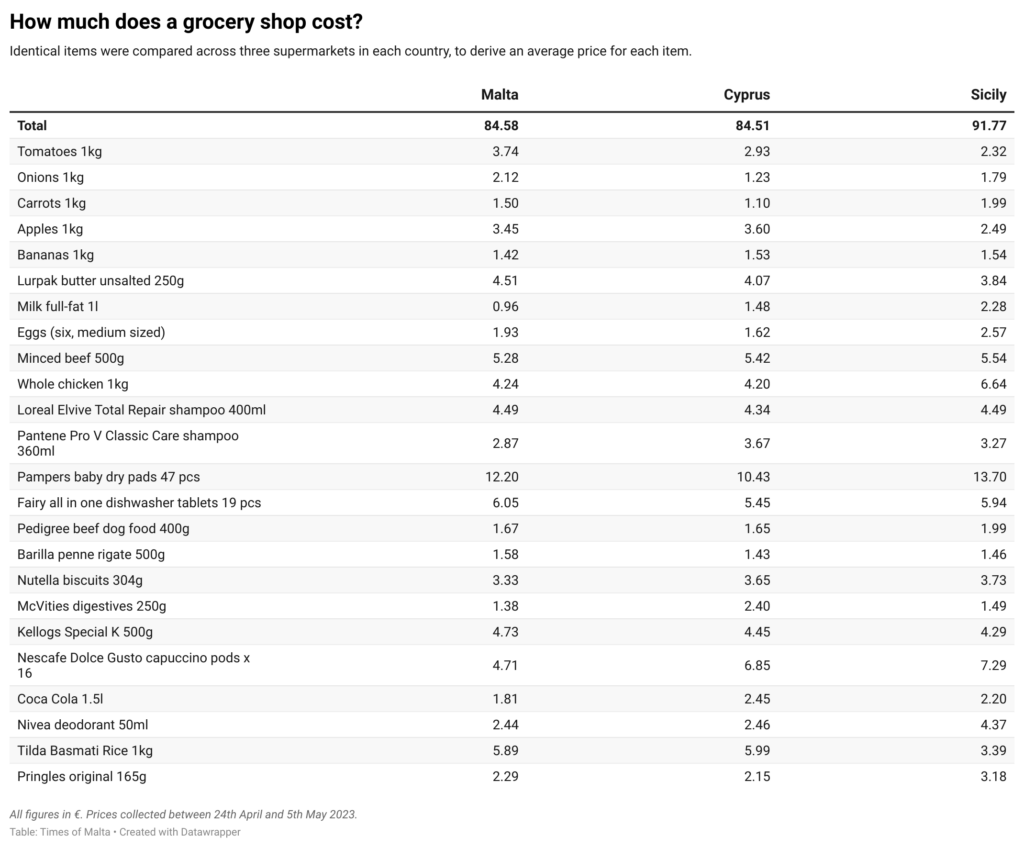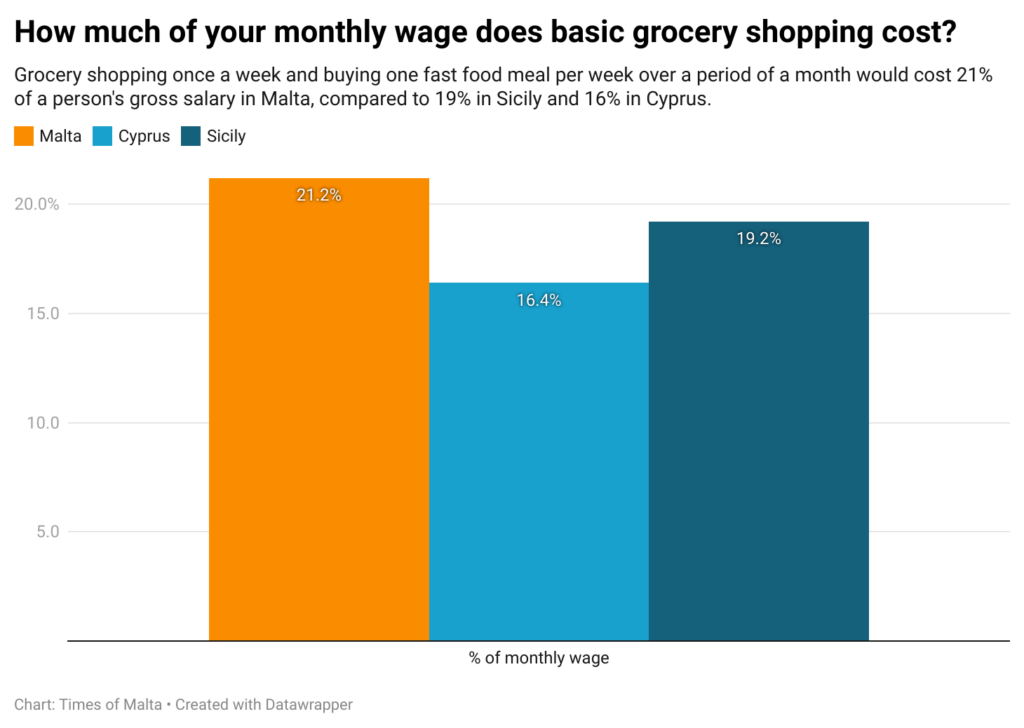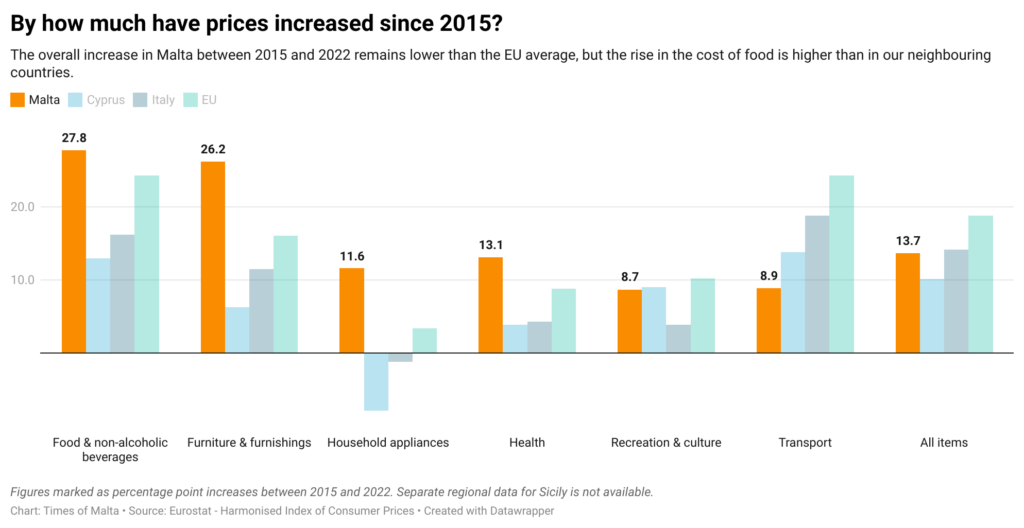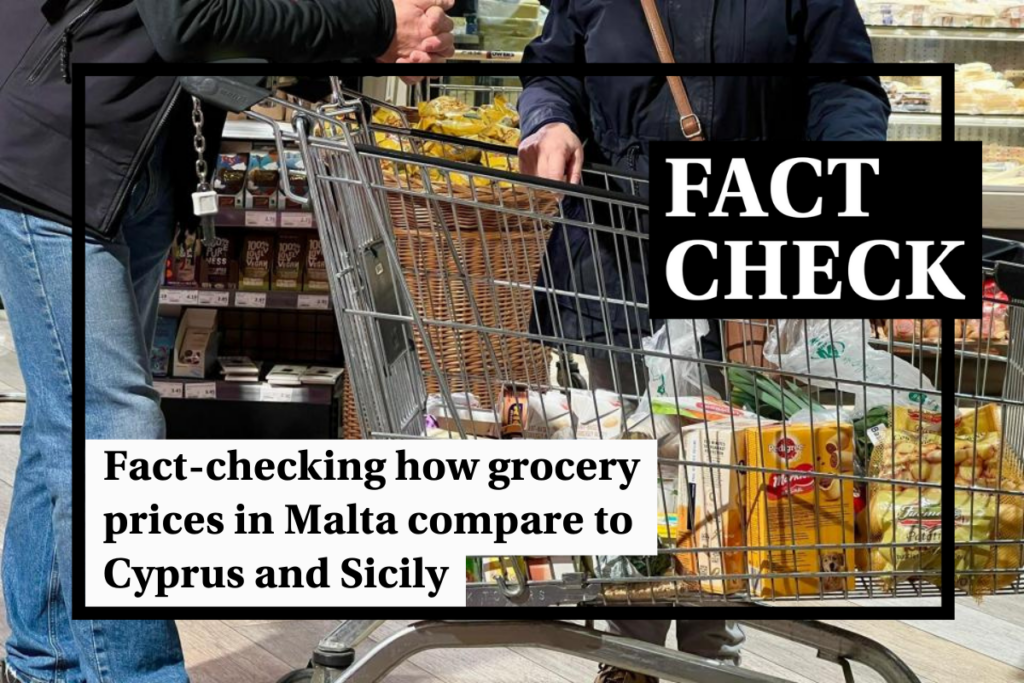Carrying out a weekly grocery shop in Malta and ordering a meal from a fast-food restaurant once a week costs 21% of a person’s average monthly salary in Malta, compared to 19% in Sicily and 16% in Cyprus according to an analysis carried out by Times of Malta.
This analysis compared the average price of several basic food items across three supermarkets in Malta, Sicily and Cyprus. Importers frequently point to the cost of sea freight as a key factor in price hikes over the past years. These three Mediterranean islands were selected for this exercise in order to compare areas with similar geographical challenges.
The food selected includes fresh fruit and vegetables, dairy products, fresh meat and poultry, dry goods such as pasta and cereals, soft drinks and dog food, as well as basic washing-up products, personal hygiene items and toiletries.
A total of 24 individual items were compared. The identical brand and quantity of each product was compared across the three islands.
The analysis found that purchasing these items would cost €84.58 in Malta, remarkably similar to the €84.51 that it would cost in Cyprus. The same shop in Sicily would cost slightly more, at €91.77.
A similar exercise based on a smaller number of identical items at a LIDL supermarket in each country found that Malta was the most expensive of the three. Items amounting to €39.36 in Malta could be purchased for €35.27 in Sicily, whilst items totalling €17.63 in Malta can be bought for €16.74 in Cyprus.

Buying a fast-food meal
The analysis also looked at the cost of a standard meal from fast-food franchises, such as McDonald’s, KFC and Burger King, within each island to compare the cost of a standard meal. Fast-food outlets were used for this exercise, rather than traditional restaurants, in order to compare identical items.
The price in Sicily was consistently the highest of the three islands, with the same Big Mac meal costing €10.50 in Sicily compared to €9.10 in Malta or €6.70 in Cyprus. Likewise, a Whopper meal from Burger King will set you back €11 in Sicily, €9.65 in Malta and just €7 in Cyprus.
In total, a fast-food meal from such a franchise is likely to cost an average of €10.28 in Malta, lower than €11.80 in Sicily, but significantly more than €7.40 for the same meal in Cyprus.
This means that if a person in Malta carries out a weekly grocery shop and consumes a fast food meal once a week, they will be spending a total of €379.44. The same purchases would cost €367.64 in Cyprus and €414.28 in Sicily.
How much of our monthly wage do you need to spend on groceries?
According to the most recent NSO data, Malta’s average monthly wage for employees was of €1,785 before tax and social security deductions. This means that the average employed worker in Malta would spend 21% of their monthly salary to buy basic groceries and eat at a fast-food restaurant once a week.
The figure for Malta’s average wage is somewhat inflated by a relative minority of employees earning over €2,000 per month. A further breakdown of the data reveals that 76% of workers in Malta earn below the average wage. For these workers, a weekly shop and fast-food meal would constitute almost a quarter of their gross monthly income.
By way of comparison, the monthly gross wage in Cyprus is €2,237 according to the most recent data from Cystat, the Cypriot statistics office. This means that the same weekly shop would cost the average person in Cyprus just over 16% of their monthly income.
Accurate data for the average wage in Sicily is more difficult to come by. Nevertheless, it is believed to hover at around €2,100 per month, with several Sicilian media outlets reporting similar figures.
This would mean that the equivalent shop and meal in Sicily would be just over 19% of a person’s monthly income.
Despite the higher average wage, Sicily is plagued by an altogether different problem, namely that of a remarkably high unemployment rate. Eurostat data lists the island’s unemployment rate at 16.6%, placing it amongst the top ten regions in Europe with the highest unemployment rate.

Cost of living concerns
A recent Times of Malta survey found that the rising cost of living tops people’s list of concerns. In an economic analysis published last month, KPMG highlighted how people are opting to cut back on non-essentials in an effort to handle inflation.
More recently, in a vox pop carried out by Times of Malta, several members of the public said they are feeling the pinch, pointing to weekly increases in the cost of basic items such as eggs, milk and meat.
What does national data say?
Official data reflects people’s concerns. The Harmonised Index for Consumer Prices, an index that measures the changes in the cost of consumer items, shows that the price of food has increased by 27 percentage points since 2015, with a dramatic 12-point increase between 2021 and 2022 alone.
This is far greater than the increase in either Cyprus or Italy over the same period, which stood at 16 and 13 percentage points respectively.
The local increase in prices can be felt across a broad range of foodstuffs. Bread and cereals increased by 31 percentage points over the same period, dairy by 27, meat by 23, and fruit and vegetables by a staggering 42.
Aside from food, the financial burden on Maltese households can be felt across several different areas. Maintaining or repairing your house costs over 20% more today than it did in 2021, with the act of engaging a painter for your house alone having gone up by a third.
Several other costs are causing people to feel the pinch, albeit to a lesser extent. The cost of purchasing items or services related to culture and recreation has grown by 7 percentage points since 2021, education by 6, personal care (such as visiting a hairdresser) by 5, and pharmaceutical products by 2.
Overall, the index shows that Malta’s cost of living increased by 7 percentage points between 2015 and 2021, only to increase by a further 7 by the following year.

The spiralling cost of consumer prices has sent the annual cost-of-living adjustment through the roof, with employers warning that the projected €13 increase for next year will have an “adverse effect on many businesses”.
Meanwhile, a study commissioned by the Housing Authority last year warned that young people are being priced out of the property market, with spiralling housing costs exceeding wage increases.
The Times of Malta fact-checking service forms part of the Mediterranean Digital Media Observatory (MedDMO) and the European Digital Media Observatory (EDMO), an independent observatory with hubs across all 27 EU member states that is funded by the EU’s Digital Europe programme. Fact-checks are based on our code of principles.
Let us know what you would like us to fact-check, understand our ratings system or see our answers to Frequently Asked Questions about the service.





